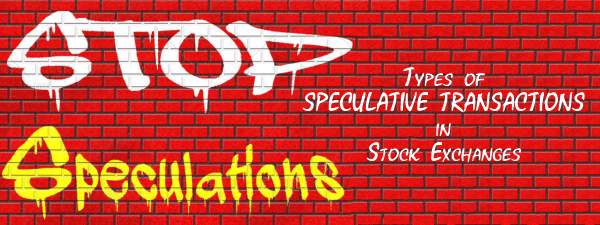Types of Speculative Transactions in Stock Exchanges
Table of Contents
Types of Speculative transactions in Stock Exchanges
7 types of Speculative transactions and how they are are carried on in stock exchanges are briefly explained below.

1. Option dealings
Option refer to a right to buy or sell a security within a certain time at a certain price. Right to purchase securities is called call option and right to sell securities is put option. When the speculator expects the price to rise, he would buy a call option. He would be able to purchase the securities at a lower price and sell it at a higher price in the future. If the price does not rise, he may not exercise his option. Put option is bought by those who expect a fall in share price.
2. Margin Trading
In this case, shares are purchased with money borrowed from brokers. The client opens an account with the broker. He deposits cash or securities into this account and agrees to maintain the margin (balance with the broker) at a certain level. When the broker purchases securities, the account of the client is debited with the amount of such securities. The net debit balance is secured by the clients securities lying with the broker.
3. Arbitrage
Arbitrage refers to benefiting from the difference in price of a security prevailing in two exchanges. The arbitrageur would buy the security in the market at which it is cheaper and sell it in the market in which it is costlier. When the arbitrage is done between two markets within the same country, it is known as domestic arbitrage. If it is done between markets in different countries, it is known as foreign arbitrage.
4. Wash sales
Wash sales refers to a transaction in which a speculator sells a particular security from one broker and buys the same security at higher price through another broker. It is a fictitious transaction. Investors are misled and they think that the market is going up and start buying. The markets go up and the speculators and brokers then sell the shares at high profits.
5. Cornering
Cornering refers to the situation in which an individual or group acquire major portion of a company’s shares. It leads to rigging.
6. Rigging
Rigging refers to the practice of artificially hiking the prices of certain shares in a bull market.
7. Blank transfers
The transfer deed contains details of only the seller. The details of the buyer are not mentioned. Blank transfers are now banned as they encourage evasion of Income Tax and Stamp duty.
